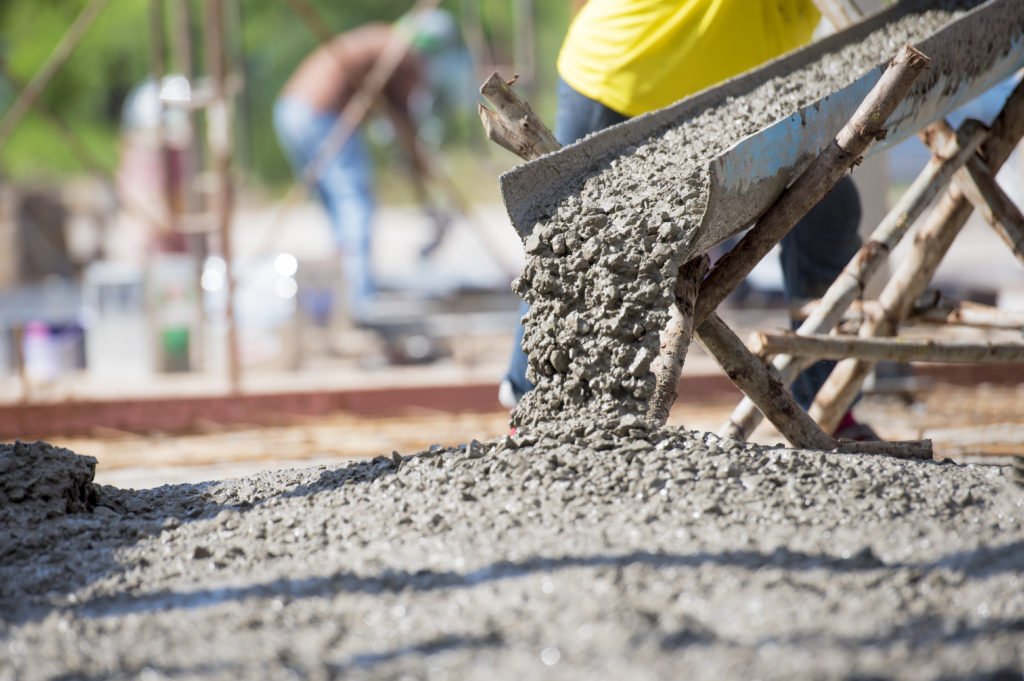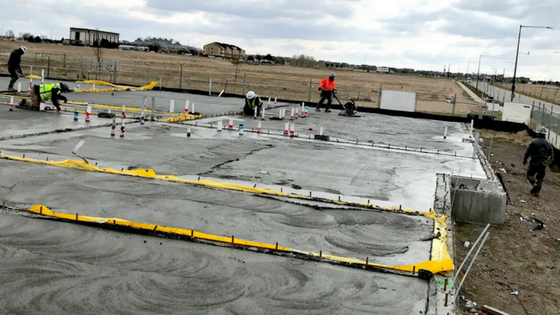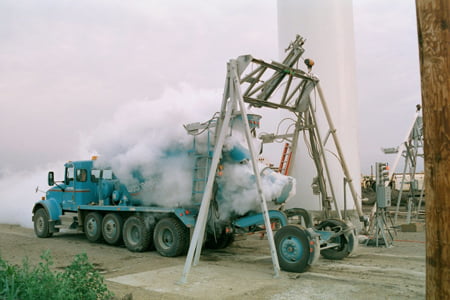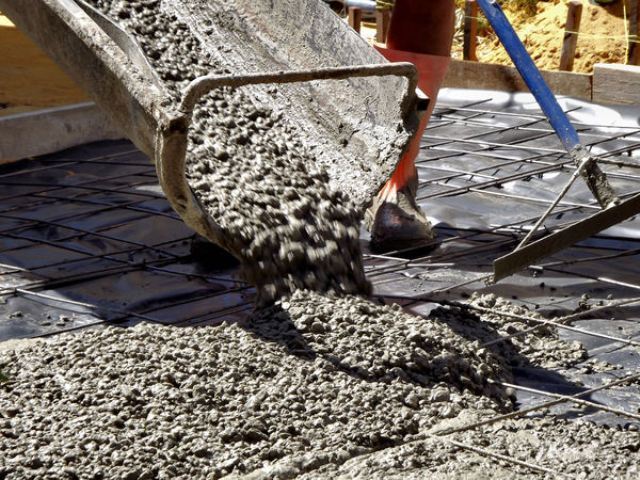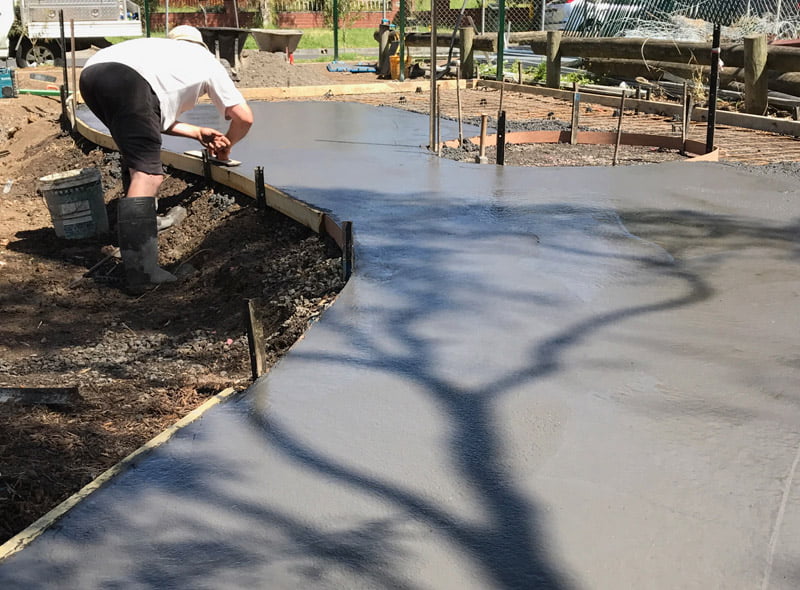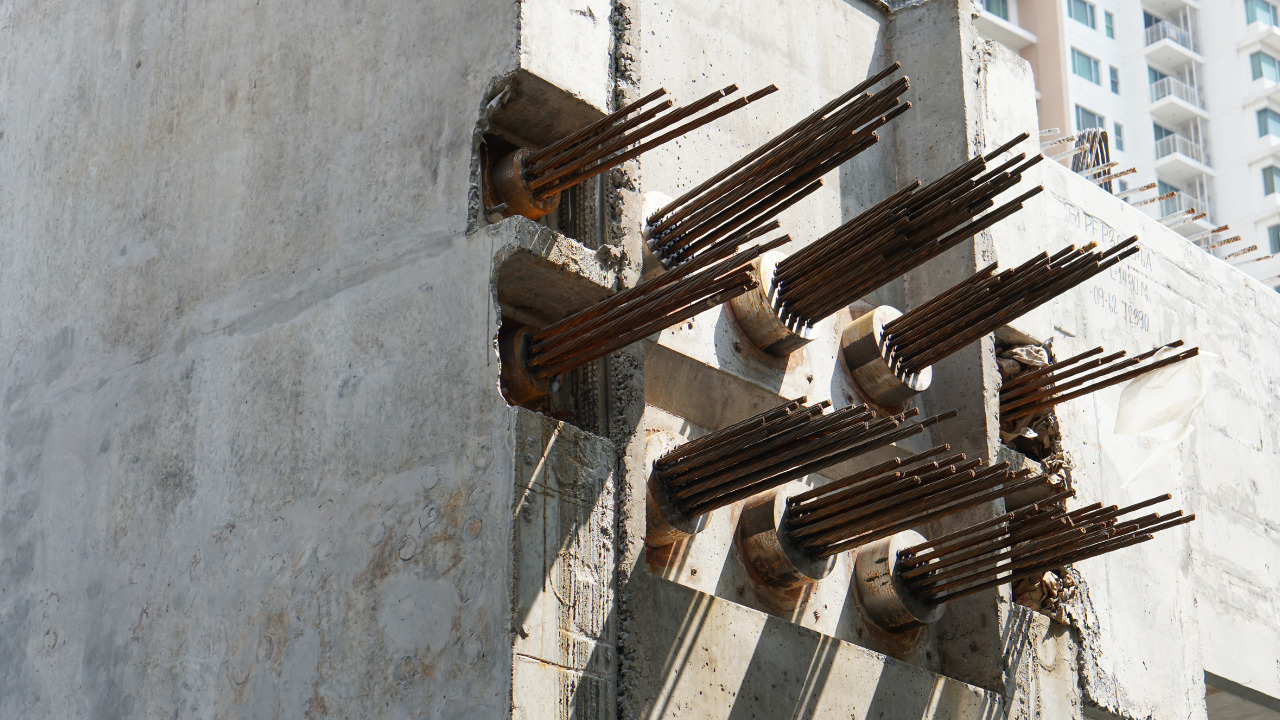Table of Contents
Introduction
While hot weather conditions are commonly encountered in summer, combinations of high temperatures, winds and low humidity could result in conditions leading to problems with concrete placement and finishing at any time.
This data sheet provides guidance on the effects of hot weather conditions on the properties of concrete, and the precautions that should be taken, particularly with flatwork, to minimize any potential adverse effects when placing concrete under these conditions.
What Is Hot Weather?
For the purposes of this data sheet, hot weather is any combination of:
- high ambient temperature;
- low relative humidity;
- high wind
AS 13791 places a 35°C limit on the maximum concrete temperature at the time of delivery.
However, when the air temperature rises above 30°C, it is usually recommended that precautions be taken, particularly if there is also hot dry wind.
This is firstly to ensure an acceptable concrete temperature at the point of delivery, and secondly to avoid problems with plastic shrinkage cracking and premature stiffening of the concrete.
Effects Of Hot Weather Conditions
Most of the problems associated with placing concrete in hot weather conditions relate to the increased rate of cement hydration at higher temperatures and the increased rate of evaporation of moisture from the fresh concrete.
The properties of concrete that may be affected by hot weather conditions include:
1) Setting time
As the concrete temperature increases, the setting time, and thus the time to place, compact and finish the concrete is reduced.
2) Workability and slump
- Higher temperatures reduce the workability (or slump) of the concrete more rapidly with time.
- Adding more water to improve the workability of the mix decreases the strength and increases the permeability, and ultimately affects the durability of the cocnrete.
3) Compressive strength
- Higher water demand and higher concrete temperature could lead to reduced 28-day If more water is added to the concrete mix at higher temperatures to maintain or restore workability,
- The water- cement ratio will be increased, resulting in a loss of both potential strength and durability.
- This may also increase the drying shrinkage of the hardened concrete.
- Where water is not added, the reduced setting time and workability increase the potential for inadequate compaction (itself of a major influence on strength), the formation of cold joints and poor finishes.
4) Concrete temperature
- Hot weather conditions may accentuate the temperature rise in concrete caused by the heat of In large sections thermal gradients through the element may cause thermal cracking.
- Laboratory tests show that sustained higher temperatures significantly influence the compressive strength gain of hardened concrete.
- While increased concrete temperatures may result in an increase in the early rate of strength gain, in the longer term, concrete cured at lower temperatures will achieve higher ultimate strength.
5) Poor surface appearance
- With the increased rate of evaporation, the surface of the concrete will dry out and stiffen.
- In the case of flatwork this may lead to premature finishing of the surface, trapping an amount of bleed water within the mix.
- The compacted surface layer (from finishing) may cause the rising bleed water to be trapped below the surface, resulting in debonding of the surface layer and subsequent flaking.
- Also, colour differences on the surface may result from different rates of hydration and cooling effects.
6) Plastic shrinkage cracking
- Hot weather conditions accelerate the loss of moisture from the If the rate of evaporation is greater than the rate of bleeding (rate at which water rises to the surface), surface drying will occur, resulting in shrinkage of the concrete.
- When the shrinkage stresses exceed the tensile capacity of the concrete, cracking will occur.
- The likelihood of plastic shrinkage cracking is therefore greater whenever hot weather conditions increase evaporation or the concrete has a reduced bleeding rate.
- Plastic shrinkage cracks can be quite deep, as the plastic concrete has little capacity to resist shrinkage stresses, and cracks continue to widen and propagate until the shrinkage stresses are relieved. (Note plastic shrinkage cracks seldom extend to free edges, as unrestrained contraction of the concrete is possible at these locations.)
7) Thermal cracking
- Concrete is at risk of thermal cracking when it is first placed, and the heat of hydration raises the temperature of the interior of the Rapid changes in the temperature of the external concrete surface.
- Such as when concrete slabs, walls or pavements are placed on a hot day followed by a cool night, lead to thermal gradients between the warm/hot interior and the colder external surface.
- The warmer interior provides a restraint to the colder external surface, which wants to contract.
- Depending on the temperature differential, cracking of the concrete may result.
- Massive or thick concrete elements are more at risk because of the insulating effect that the concrete provides to the interior of the element.
Minimizing The Effects Of Hot Weather Conditions
1) Control concrete temperature
- AS 1379 requires that concrete temperatures at the point of delivery be within the range 5°C to 35°C. For high ambient temperatures, precautions need to be taken by the supplier to ensure that the concrete temperature at the point of delivery is within the allowable range.
- There are a number of options to control the temperature of concrete, including adjusting the temperature of the ingredients and/or cooling of the concrete mix. The sensitivity of the temperature of a normal concrete mixture to that of its components can be demonstrated by the following formula:
T = 0.1 Tc + 0.6Ta + 0.3Tw
where
T = concrete temperature
Tc = temperature of the cement Ta = temperature of the aggregate Tw = temperature of the water.
- Because aggregates make up the bulk of the concrete, and also have the highest heat capacity, they have the greatest effect on the temperature of the freshly mixed concrete.
- Unfortunately the temperature of the aggregates is also the most difficult to control.
- Some benefit can be gained from shading stockpiles from the sun and/or keeping them moist with sprinklers. Storage in bins (painted white) will also assist.
- The mix water offers the most potential for temperature reduction, particularly by adding crushed ice to it, as the latent heat of the ice is considerably higher than that of water.
- The temperature of the cement does not usually contribute significantly to the temperature of freshly mixed concrete because of its low specific heat and relatively small mass in the mix.
- Liquid nitrogen, injected into the concrete while mixing, may also be utilised.
- Latent thermal energy on vaporisation to gas cools the concrete dramatically without any known deleterious effect.
- It should be noted that this process is usually economical only on major projects involving construction of large concrete elements.
2) Admixtures
- Various types of chemical admixtures can be beneficial in hot weather Water reducers (plasticisers) can be used to reduce the water content or to aid the workability.
- This enables rapid placement and consolidation of the concrete with beneficial effects on the ultimate strength and durability.
- Set-retarders can provide additional time to place and finish flatwork.
- With rapid drying of the surface, caution is required with the use of set retarders, as the surface may appear ready for finishing, but the concrete below may still be plastic from the retarder, leading to a ‘spongy’ feel under foot.
- This could affect the uniformity of the surface finish.
3) Cement type
- Selection of a particular cement type may provide additional benefits.
- Using slower hydration cements (eg Type LH) with lower rate of heat development can provide extra time for placing and finishing, reduce the concrete temperature and the risk of thermal cracking upon cooling of the concrete.
4) Cement content
- The temperature increase from hydration of cement in a given concrete is proportional to its cement The cement content therefore should be limited to that required to provide strength and durability.
Precautions In Hot Weather Conditions
1) General
- Problems usually arise when site personnel are not aware of the effect of weather conditions and/or weather conditions change during the placing and/or finishing of the Improvised responses to unexpected changes is not recommended as the damage that can result from uncontrolled effects of hot weather conditions may never be completely alleviated.
- The first option to be considered in hot, adverse weather conditions is whether or not to postpone the placement of concrete. It is often better to wait than risk costly repairs (or even replacement) of defective work and dissatisfied clients seeking compensation.
- If work is to proceed, proper planning from careful selection of materials to procedures for hot weather work is essential if the associated risks are to be minimised.
2) Planning
A successful, well-run, hot-weather project is the result of thorough and careful Planning for hot weather conditions is essential because of the potential effects on fresh and recently placed concrete.
For plastic concrete these include increased water demand and risk of plastic shrinkage cracking, greater slump loss, faster setting and difficulty in controlling entrained air content; for hardened concrete they include reduced strength and durability, and increased drying shrinkage.
While the designer or specifier may control some items on the following list, it may not always be possible to anticipate just when and under what weather conditions the work will be carried out. Therefore the builders and sub-contractors should also be aware/alert to all of the possibilities.
- Where hot weather conditions are likely to present a problem, consult the concrete supplier as early as possible.
- Have standby equipment and manpower for all stages.
- Use the largest size and amount of coarse aggregate compatible with the job. This also helps minimise the tendency of the concrete to crack.
- In determining the slumps of the concrete to be used, consider the effects of hot weather on the ability to place and finish the concrete.
- Programme concreting for the cooler parts of the day, or even schedule night-time placement if possible.
- Specify the maximum acceptable delivery temperature of the concrete so that the supplier can plan to cool the materials as needed.
- Avoid delays at all stages.
- Plan the locations of construction joints ahead of time with hot weather contingencies in mind.
- Consider spacing contraction (control) joints at slightly smaller intervals than when concreting at lower temperature.
- Use sunshades or windbreaks.
- Delay construction of indoor slabs on grade until the walls are up and the roof is on.
- Pay attention to the rate of concrete Be ready to notify the concrete supplier promptly of any changes in schedule, which may become needed as the job progresses.
- Keep an evaporative retarder (aliphatic alcohol) on site in case conditions require its use.
3) Concrete Production
- The concrete supplier’s responsibility is to manufacture and deliver the concrete in accordance with AS 1379. The following methods can be used by the supplier to assist with the placing of concrete in hot weather:
- Shade stockpiles, sprinkle aggregates ahead of time for evaporative cooling, or cool them by other means.
- Paint the mixer and storage bins white to minimise absorption of heat from the sun.
- Use ice as part of the mix water or cool the concrete with liquid nitrogen.
4) Delivery and Discharge
- Delays in delivery can undo the best mixing The concrete supplier should set up and maintain a good delay-free schedule for delivering the concrete to the required location on the site.
- Minimise transport time and avoid unnecessary delays.
- Avoid prolonged Transit mixer trucks should be discharged as soon as possible after the water has been added to the mix.
- For large projects, consider batching and mixing the materials using a job-site plant.
- Water should not be added to pre-mixed concrete at the job site unless it is part of the amount required initially for the specified maximum water-cement ratio and the specified slump.
5) Placing and Finishing
- For successful placing and finishing it is necessary to provide an environment in which workers and equipment can function well, and concrete can be adequately protected from rapid warming and/or
- Schedule placement for the cool time of the day such as early morning or late On some jobs, concreting at night (if permitted) may be more advantageous.
- Have all forms, equipment and workers ready to receive and handle concrete, especially the first delivery.
- Use sunshades and/or wind breaks
- Keep all equipment that touches the concrete cool (chutes, conveyors, pump lines, tremies, reinforcement and buggies). Protecting equipment from the direct sun will If it can’t be kept continuously cool, spray-cool it as necessary with water.
- For a slab without a vapour barrier under it, dampen the sub-grade before placing concrete.
- Use cool water to dampen side forms for slabs or walls.
- Use a thermometer to monitor the temperature at which concrete is being delivered, and call for adjustments at the plant if necessary.
- Expect concrete to set more rapidly and have a shorter finishing time.
- Ensure that slabs have a ‘minimum’ front to which fresh batches of concrete are added.
- Perform all operations rapidly, but don’t finish slabs prematurely, eg while bleed water is still on the surface.
6) Evaporation Control
- Protect the surface of concrete slabs at all stages against excessive evaporation and premature drying out by using an evaporative retarder such as aliphatic Aliphatic alcohols are applied to the freshly placed and screeded concrete surface, where they form a chemical film which reduces the rate at which water evaporates from the surface of the concrete. By controlling the premature drying out of the surface layer of concrete, the tendency for the concrete to shrink and for plastic shrinkage cracking to occur is reduced or eliminated.
The benefits of using aliphatic alcohols on the concrete surface can be manifested in many ways as listed below. These benefits are usually realised with no effect on the cement hydration and/or setting time of the concrete.
- Improves surface workability and thereby increases project and labour productivity.
- Improves surface finishing, and in turn durability, abrasion resistance and resistance to the ingress of water-borne contaminants.
- Assists in eliminating the damaging practice of ‘wet wiping’ or spraying water onto the dry patches during trowelling of the concrete, and thus helps to prevent surface dusting problems.
- Significantly reduces surface crusting. Surface crusting can cause problems with cracking, particularly with stamped concrete finishes.
- Reduces the risk of premature surface finishing – by allowing the concrete to properly A dry surface layer may appear to indicate that the concrete has set, but can lead to a ‘spongy concrete’ effect, as the concrete below is still plastic. This may result in flaking and an uneven surface finish.
- Virtually eliminates differential surface drying.
Aliphatic alcohols have an average coverage of 60 to 80 m2 per litre. Because the dilution rate varies depending on the specific product, the application rate should always be in accordance with the manufacturer’s specifications.
In adverse or severe weather conditions, or in situations where the surface is worked (or the coverage is otherwise broken), the aliphatic alcohol may need to be re-applied to maintain an effective cover (ie after bullfloating, trowelling and other surface floating). In extreme conditions there may be a requirement for 5 to 6 or more applications to prevent the rapid drying of the surface while the concrete sets and bleed water dissipates.
Most aliphatic alcohols contain a ‘fugitive dye’ to assist the monitoring of coverage. The dye has no effect on the strength or colour of the concrete.
7) Curing and Protection
- It is essential that all surfaces be kept continuously moist by curing the concrete, since drying, even intermittently, can produce drying shrinkage and/or crazing type cracking on the concrete
- Curing should commence immediately after the slab has been finished, and is particularly important during the first day after placement, and in hot or windy conditions.
- Curing methods include ponding with water, use of wet hessian or cotton mats, continuous spray mist, covering with plastic sheeting or sprayed on curing compounds.
- When forms are removed, curing should be provided to the newly exposed surfaces.
- Some means of water curing is advantageous in hot weather as the water also assists in cooling the concrete while it hardens and gains Care is required, however, as the surface needs to be sufficiently hard before water curing can be undertaken without risk of surface damage. This may leave the surface exposed to drying and possible cracking between completion of the finishing and commencement of the curing.
- Note that aliphatic alcohols are NOT curing compounds and should not be specified or used as a substitute for Aliphatic alcohols are used between the initial screeding and final finishing operations, and adequate curing of the concrete must still be provided once final finishing has been completed. While aliphatic alcohols are compatible with most curing compounds, this should be checked if products are purchased from different manufacturers.


